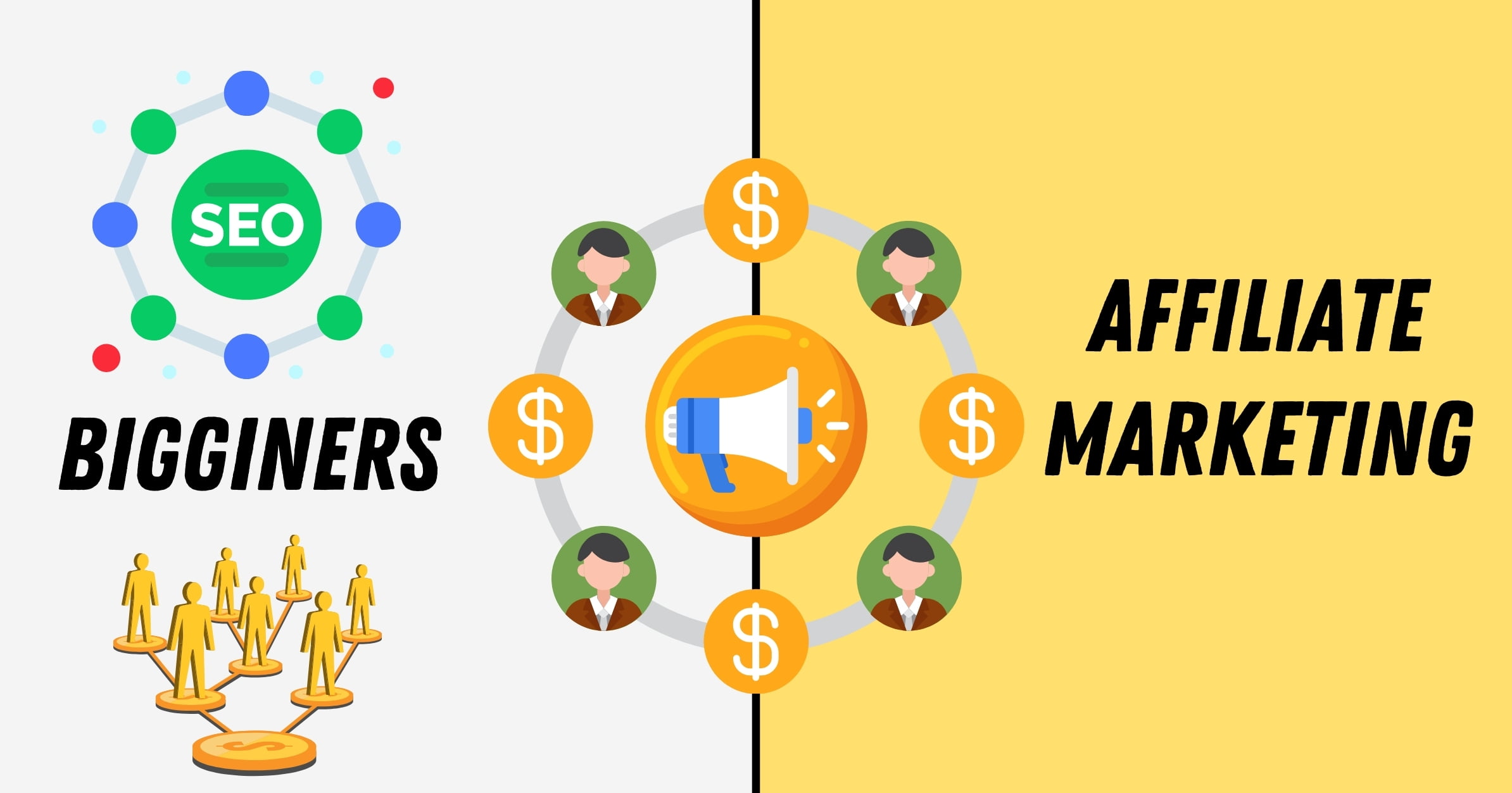Before anything else first, pick a topic that fits your hobbies and areas of experience to get started with affiliate marketing for free. This is very important as it will define what kind of goods or services you will advertise as an affiliate. It’s critical to choose a specialty that you are enthusiastic about since it will facilitate the creation of insightful content and audience engagement.
The next stage after selecting your specialty is to look for affiliate programs that provide goods or services associated with it. You may join up for free on a number of affiliate networks and platforms, such ClickBank, ShareASale, and Amazon Associates, and peruse a large selection of affiliate programs.
To begin with first, pick a topic that fits your hobbies and areas of experience to get started with affiliate marketing for free. This is very important as it will define what kind of goods or services you will advertise as an affiliate. It’s critical to choose a specialty that you are enthusiastic about since it will facilitate the creation of insightful content and audience engagement.
The next stage after selecting your specialty is to look for affiliate programs that provide goods or services associated with it. You may join up for free on a number of affiliate networks and platforms, such ClickBank, ShareASale, and Amazon Associates, and peruse a large selection of affiliate programs.
It’s crucial to take into account aspects like earnings percentages, cookie length, and merchant reputation when choosing affiliate programs. To boost your chances of making a sizable revenue, look for services that provide longer cookie durations and reasonable commission rates.
Making a website or blog where you may advertise the goods or services you are associated with is the next step after selecting your affiliate programs. Fortunately, novices can easily establish a professional-looking website without any coding or design expertise thanks to the abundance of free website builders and blogging platforms, including WordPress and Wix.
It’s important to start producing quality content that will draw in and keep your target audience interested as soon as your website is operational. Blog entries, product reviews, guides, and even videos might fall under this category. The secret is to give your audience insightful advice and useful information so they may make well-informed purchases.
Search engine optimization is just as vital as content creation for your website. This entails enhancing your meta tags, creating high-quality backlinks, and employing pertinent keywords to increase the visibility of your website in search engine results. Even while this can seem intimidating, you can learn a lot about search engine optimization and navigate the world of it with the aid of many free SEO tools and websites.
Last but not least, it’s important to monitor your affiliate marketing activities and evaluate the results of your initiatives. This will assist you in determining what is and is not effective, enabling you to optimize your tactics through data-driven decision-making. Free analytics programs like Google Analytics may offer insightful data on traffic, revenue, and conversion rates on your website.
In conclusion, with the correct methods and tools, it is quite possible to begin affiliate marketing for free in 2024. You may start a profitable affiliate marketing journey without investing any money by selecting a topic, locating affiliate programs, building a website, writing quality content, optimizing for search engines, and monitoring your progress.
What is Affiliate Marketing?
Instead of getting into the specifics, let’s clarify what affiliate marketing is. As a performance-based marketing tactic, affiliate marketing pays people a commission for each sale or lead they bring in by having them advertise other people’s or businesses’ goods. Both the product owner and the affiliate marketer benefit from this scenario.
You don’t have to make your own items or manage customer service when you work as an affiliate marketer. Convincing your audience to make a purchase and increasing traffic to the product owner’s website are your primary goals. The remainder is handled by the product owner, including customer support and order fulfillment.
Because affiliate marketing has the ability to produce passive revenue, it has become incredibly popular in recent years. Affiliate marketing has grown in popularity as a profitable option for people wishing to work from home because of the growth of e-commerce and the rise in online sales.
The adaptability of affiliate marketing is one of its main benefits. You are free to select the goods or services you wish to advertise as an affiliate marketer. Niche items that suit your hobbies and areas of expertise may be chosen, which will facilitate the creation of engaging content and draw in a specific audience.
Additionally, affiliate marketing enables you to take use of the internet’s capacity to reach a worldwide audience. By using effective marketing techniques, you may draw in people from around the globe and raise your chances of receiving commissions. With the ability to access a wide range of marketplaces and specialties, affiliate marketers are able to pursue countless opportunities due to their worldwide reach.
Affiliate marketing provides scalability in addition to flexibility and worldwide reach. Affiliate marketing enables you to increase your business without incurring considerable overhead costs, in contrast to typical firms that need substantial capital and resources to grow. You can promote more than one product or diversify into other markets as your audience increases and your marketing strategies become more successful.
It’s important to remember that affiliate marketing is not a quick way to become wealthy. Developing an affiliate marketing business successfully takes time, work, and commitment. To stay ahead of the competition, you must make an investment in understanding best practices, keeping up with the newest trends, and consistently improving your marketing techniques.
In summary, affiliate marketing is a performance-based marketing approach that lets consumers advertise other people’s goods and services in exchange for a passive income. For individuals wishing to monetize their online presence, affiliate marketing has gained popularity due to its scalability, flexibility, and worldwide reach. However, dedication and a readiness to change with the always evolving digital world are necessary for success in affiliate marketing.
Choosing the Right Niche
Selecting the appropriate niche is one of the first stages in beginning affiliate marketing. A niche is a certain area of the industry that your affiliate marketing campaigns will focus on. Selecting a field in which you are knowledgeable and have a strong sense of enthusiasm is crucial.
Take into consideration some of the following factors while choosing a niche:
- Commission Rates: Seek for initiatives that provide reasonable commission rates. Increased commission rates might have a big effect on your income. Achieving equilibrium between commission rates and the product’s price point is crucial, though. While a lower commission rate on a high-priced product may nevertheless provide a sizable revenue, a higher commission rate on a low-priced product could not produce meaningful earnings.
- Product Quality: Make sure the goods or services you plan to advertise are of the highest caliber and suit the requirements and preferences of your target market. Investigate the product’s reputation, user feedback, and market demand in general in-depth. Endorsing subpar items can erode your audience’s confidence and credibility, which will reduce conversions and revenue.
- Affiliate Support: Verify whether the affiliate program offers you the tools and assistance you need to be a successful affiliate marketer. Seek out programs that provide marketing assets like product photos, banner ads, and promotional writing. Furthermore, take into account if the program provides devoted affiliate assistance, like a helpful affiliate manager or a community forum where you can interact with other affiliate entrepreneurs. Having these tools at your disposal can improve your marketing efforts and offer helpful advice all along your affiliate journey.
Creating a Website or Blog
A blog or website is necessary for affiliate marketing. It acts as your online platform for sharing informative material with your audience and showcasing the things you are marketing. Thankfully, it’s now less expensive and easier than ever to start a website or blog.
The steps required to make a website or blog are as follows:
- Choose a Domain Name: Choose a domain name that is catchy and accurately represents your niche. Your domain name need to be distinctive and appropriate for the content of your website. To help visitors locate and remember your website, it should also be brief and memorable.
- Register a Domain: You must register your selected domain name with a domain registrar after you’ve made your selection. Numerous domain registrars are accessible, including Bluehost, Namecheap, and GoDaddy. Selecting the appropriate domain extension—such as.com,.net, or.org—and providing correct contact information are crucial when registering a domain.
- Choose a Web Hosting Provider: After registering your domain, you need to select a reliable web hosting provider to host your website. A web hosting provider stores your website’s files and makes it accessible to visitors. When choosing a web hosting provider, consider factors such as uptime, speed, customer support, and pricing. Some popular web hosting providers include SiteGround, Bluehost, and HostGator.
- Install a Content Management System (CMS): Installing a content management system (CMS) is necessary to manage the content of your website after you have a domain name and web hosting. WordPress is a widely used content management system (CMS) platform that is renowned for its intuitive interface and ample customization capabilities. WordPress can generally be installed easily using the control panel provided by your web hosting company.
- Customize Your Website: Once a CMS is installed, you may tweak the website’s appearance to better represent your brand. There is a vast selection of themes and templates available on WordPress. You may alter the color scheme, font choice, and addition of your logo to further personalize the look of your website. You may also add plugins to improve the features on your website, such search engine optimization tools, social network integration, and contact forms.
- Create Valuable Content: It’s time to start producing insightful material relevant to your niche after your website has been configured and modified. Blog entries, product evaluations, guides, and more can fall under this category. Your writing should be interesting, educational, and pertinent to the people who will be reading it. You can draw in and hold on to readers, become recognized as an authority in your field, and eventually increase traffic and conversions to your affiliate offers by producing high-quality content.
Recall that setting up a website or blog is only the beginning of your affiliate marketing adventure. You must constantly create excellent content, interact with your audience, and search engine optimize your website if you want to prosper. To stay ahead of the competition, it’s also critical to keep up with the newest tactics and trends in affiliate marketing. You may use your website or blog to create a profitable affiliate marketing business with commitment, perseverance, and the appropriate strategy.
Driving Traffic to Your Website
The next step after launching your website is to increase traffic to it. Your affiliate marketing efforts will be ineffective without traffic. You may use a variety of techniques to get people to your website.
The following are some efficient strategies to increase website traffic:
- Search Engine Optimization (SEO): To rank higher in search results, make sure your website is search engine optimized. Researching keywords, optimizing the website, and creating solid backlinks are all included in this.
- Content Marketing: Provide content that speaks to your target audience and is both valuable and shareable. Infographics, films, blog entries, and more may fall under this category.
- Social Media Marketing: Use social media forums to communicate with your audience and promote your work. Determine which social media sites are most widely used by your target market, then establish a strong online presence there.
- Email Marketing: Create your email list and send out newsletters and promotional emails to members on a regular basis. By doing this, you are able to communicate with your audience directly.
There are other methods to increase website traffic besides these tactics. Working together with influential people in your sector is one successful strategy. Influencers may assist in promoting your website to their audience because they have a sizable following. Guest writing, paid material, and social media shoutouts are some ways to do this.
Internet advertising is another method of increasing traffic. You may make targeted advertisements that show up in search results or on social media feeds using platforms like Google advertisements and Facebook Ads. You may drive relevant visitors to your website by narrowing down on your target demographic and refining your marketing campaigns.
Engaging in online forums and groups relevant to your specialty can help increase website traffic. You may become recognized as an expert in your field and get clients who are interested in what you have to offer by giving insightful answers to queries.
Finally, never undervalue the effectiveness of offline marketing. There is still potential for traditional advertising strategies, such print ads, radio spots, and TV commercials, to increase website visitors. You may encourage those who are interested in learning more to visit your website by putting the URL of your website in your offline marketing materials.
All things considered, increasing website traffic necessitates a multifaceted strategy. You can maximize your affiliate marketing efforts and drive a consistent flow of traffic to your website by combining online advertising, offline marketing, influencer partnerships, social media marketing, email marketing, SEO, content marketing, online advertising, and community involvement.
Being a dependable information source is a crucial component of developing trust and credibility in affiliate marketing. Accurate and current content may be continuously provided to achieve this. Prior to posting, double-check your material, and whenever feasible, cite reliable sources. By doing this, you convey to your readers your knowledge as well as your appreciation for dependability and accuracy.
It’s important to be truthful and genuine in your suggestions in addition to being open and honest about your affiliate affiliations. Don’t inflate a product’s benefits or make untrue promises. Rather, give a candid evaluation of the product’s advantages and disadvantages, and then step back and allow your audience draw their own conclusions.
Additionally, maintaining consistency in your branding and messaging is necessary to establish credibility and confidence. Create a voice that is understandable to your target audience that is clear and consistent. Using a unified tone, style, and set of visual components on your website, social media accounts, and other communication platforms is part of this.
Social data is a powerful tool for establishing trust. Distribute endorsements and testimonies from happy clients who have profited from the goods or services you advertise. This increases your reputation and inspires trust in your suggestions from your audience.
Finally, developing credibility and trust requires patience. Building trust takes time and requires sincere efforts that be sustained. Maintain your dedication to adding value and interacting with your audience, and trust will grow on its own.
Monitoring and Optimizing Your Performance
After launching an affiliate marketing company, it’s critical to keep an eye on and improve your performance. This entails monitoring your affiliate links, examining the metrics on your website, and making data-driven choices to enhance your outcomes.
Observe the following important metrics:
- Click-Through Rate (CTR): Keep an eye on the proportion of visitors that click on your affiliate connections. A higher CTR suggests that your recommendations are well-received by your audience.
- Conversion Rate: Keep track of the proportion of visitors that finish a desired action or make a transaction. A greater conversion rate suggests that your audience is more likely to buy from you and trusts your advice.
- Earnings Per Click (EPC): Calculate the average earnings you generate per click. This metric helps you identify which products or promotions are performing well.
You may optimize your affiliate marketing approach by making well-informed decisions based on your performance statistics. This might entail making changes to your content, experimenting with various marketing tactics, or concentrating on items that have greater conversion rates.
Additionally, it is imperative that you examine the sources of traffic to your website. You can determine which marketing channels are generating the most traffic and conversions by knowing where your website visitors are coming from. You may use this information to focus on the channels that produce the greatest returns and allocate your money more wisely.
It’s critical to routinely evaluate the success of your affiliate relationships in addition to keeping an eye on your metrics. Assess the caliber of the goods or services you are endorsing in addition to the dependability and standing of the affiliate networks you are collaborating with. If you discover that a certain relationship isn’t producing the desired outcomes, think about looking into other options or renegotiating the conditions.
Keeping up with industry developments and best practices is another way to maximize your effectiveness. Since affiliate marketing is a dynamic field, strategies that were effective a year ago might not be so today. Keep up with developing markets, consumer trends, and technological advancements to make sure your tactics are still applicable and successful.
Finally, never undervalue the significance of ongoing exploration and testing. Try a variety of strategies, including altering your call to action, examining other landing sites, or attempting various ad layouts. You can determine what resonates most with your audience and make ongoing improvements to your performance by testing new things frequently and evaluating the outcomes.




Pingback: 100 Richest Countries in the World by GDP per capita in 2024 - Binsari